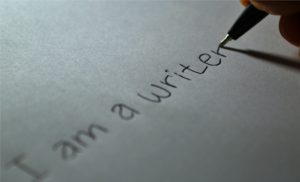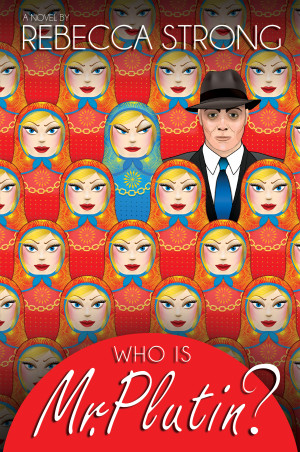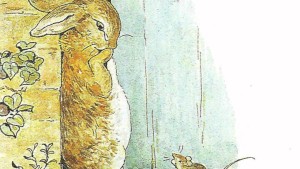Johanna Costigan was featured at Bard College, reading the following story. Listen to the episode here.
Thatcher Hanson wore mustard-colored ties and made unfulfilled travel plans. He lived in the suburbs and had coffee breath. He let his lawn go and loved foreign film.
One day, during his morning commute, he stood on the train platform and eavesdropped on a couple of young women.
“I mean what’s going on with you guys…” Girl One said, thumbing her phone.
“We’re over, but I don’t know…”
Long pause until Girl One realized Girl Two was waiting to be egged on.
“I mean what don’t you know…”
“Well he cheated on me…”
“Yeah…”
“But like…”
“What?”
“I saw him at Walmart the other day and his biceps looked flawless.”
Girl One’s turn to pause.
Finally, “Oh damn, that’s complicated.”
Thatcher thought about what it would be like to be around people and not understand what they were saying. He thought it might allow him to have a clearer headspace. He wouldn’t be constantly encountering snippets of other people’s lives. He could just think about nothing. He believed emptiness was a prerequisite to happiness.
He thought about standing on a train platform somewhere in Latin America, letting the Spanish wash over him. But he had taken Spanish in high school, and what if some of it came back? Not to mention the fact that there are so many Spanish words any English-speaker could understand without substantial effort. Then he’d get snippets of snippets, even more fragmentary truths about people and things he didn’t care about. He wanted to go somewhere where nothing would be discernable, where he could live happy and alone in his own empty head.
At work, Thatcher was distracted. He kept looking through his travel folders, filled with information about hotels and restaurants in cities all over the world. His favorite hobby was compiling this information, comparing flight prices, looking at photos of tourist attractions he would never visit. He found it to be a calming exercise, to imitate a sort of ambition for adventure that he did not possess.
He lingered on the China folder. He couldn’t think of any country that had comparable characteristics. China was huge, both in geography and population. It was globally relevant and nebulously threatening to many Western countries. Most importantly, he found the language entirely incomprehensible. To him, Chinese characters might as well be pieces of abstract art; they were meaningless shapes that his eyes stumbled over with the glee of ignorance. He listened to recordings of Chinese to find that it sounded like some kind of horrible, gritty jazz, its direction undecided, its syllables totally disjointed. He didn’t know when one word started or ended. He was delighted by his conclusion that it wasn’t the sort of language one would just “pick up.” He’d have to put real energy and effort into learning it–which he wouldn’t!
A few days later, Thatcher delved further into his travel planning than he ever had before. He actually purchased a plane ticket to Beijing. He had a large sum of money saved, mostly because his job paid well and his life expenses were minimal, so the investment wouldn’t be cataclysmic, even if he ended up chickening out and not getting on the plane. He had vacation days saved too. He had no family or notable friends to visit anyway. He looked at the China trip as a way to both reflect and meditate.
But it turned out Beijing wasn’t a very reflective and meditative place, Thatcher realized after stepping off the plane a few weeks later, carrying a bag full of his own vomit that he kept missing opportunities to dispose of. The plane ride had been stressful. He had spent it regretting his decision and debating whether asking the pilot to turn around was too needy.
His fears were largely confirmed as he walked through the chaotic airport and onto the street, where cab drivers were fighting over customers and customers were fighting over cab drivers. The air was muggy and Thatcher was coughing, giving himself the opportunity to experience his vomit breath once again. He turned to his left and spotted another trash can. Refusing to continue holding the bag of vomit, he very consciously walked toward the bin and dropped the bag over its opening.
Thatcher wasn’t an aggressive person, so it took him a long while to be noticed by a driver and taken in. He told the driver the address of his hotel using English numbers and mispronouncing the Chinese pinyin. The driver responded with an irritated grunt, followed by an utterance of, “No.”
“719 goo she a loo,” Thatcher repeated, reading off a printout of his reservation confirmation he had brought with him for this exact purpose.
The driver made a gesture that said, “Give me the paper.”
Thatcher did, disappointed in himself for not thinking to do so immediately.
“Ahhh, 七一九 国下路, 好的,” The driver nodded and started speeding so severely that Thatcher felt inspired to hold onto the ceiling and seat of the small cab with both of his suddenly oversized, trembling hands.
He was deposited in front of his Marriott about forty minutes later. The driver had been on the phone throughout the ride, and Thatcher felt soothed by his incomprehension of the violent language. When it came time to pay, the driver continued accepting money until Thatcher was out of cash. He thought 560 kuai seemed expensive for the ride, but what did he know.
The woman at reception spoke adequate English, which Thatcher first found comforting and relieving, but then recalled the mission of his trip, and remembered to be disappointed by it.
The next day, he explored. He wanted to see the Great Wall, so he had the hotel concierge reserve him a seat on a tour bus that would take him there and back. The Wall was about an hour and a half from the city. The tour guide described the sights they drove past in Chinese; Thatcher listened closely and learned nothing.
The guide warned them that they’d be making a brief stop to get a snack and use the bathroom. It was unclear whether the decision to stop was at all related to the fact that two babies had already relieved themselves onto their loudly unforgiving mothers’ laps. Regardless, they got out of the bus and stretched their legs and surveyed the food being sold on the street. There were meat and rice and dumpling carts, none of which looked particularly appealing to Thatcher, who was more interested in trying something he didn’t recognize at all. He meandered down the road until he got to a more sparsely populated section.
One cart was apparently selling Hong-Kong style snacks, which Thatcher gathered by the proprietor’s shouts in sudden English as he saw Thatcher walk past him, “Hong Kong snack! Very authentic!” The food did in fact appear to be particularly exotic to Thatcher, which he considered a confirmation of the man’s promise of authenticity. Upon closer inspection, Thatcher found all of the foods to be utterly unrecognizable. He bought a small deep fried ball on a stick. He found it mildly revolting, but also very spicy. He then tried chicken feet, which were deep fried in what he presumed to be the traditional Hong Kong style, flavored with black beans and sugar. They were surprisingly good. Thatcher peered down the road to make sure his bus was still there. He saw it, and the driver standing outside smoking a cigarette. He decided he had time to try one more Hong Kong snack. He used gestures to try to ask the man which one he would recommend. The man seemed really enthusiastic about these slabs of meat that resembled a kind of reptilian bacon.
Thatcher was taken aback. Before he had swallowed his first bite, he was already mumbling and gesturing to the proprietor to give him another order. He had never tasted something so delicious. It was crispy and fried, extremely tender and slightly sweet. He stood there, focused completely on the tastes in his mouth and the ambiance of the road, the people walking by him speaking words he couldn’t understand. He felt nothing. He was truly happy.
Down the road, his bus driver honked the horn. He thanked the Hong Kong snack man profusely and made his way back onto the bus, where he savored the remaining tongues in a way that caused the only other English-speaking people there to stare at him with curiosity and disgust.
“Sir, what are you eating?” the wife asked.
“I’m not sure. Just got it from one of the carts out there. I don’t know what it is but I know I love it.”
“Really?”
“Looks like some sort of animal appendage” the husband contributed.
“Can I get a closer look?” the wife asked.
“Absolutely.” Thatcher handed her one, hoping she wouldn’t get ahead of herself and try to eat it. He was down to only six remaining pieces.
She surveyed it for a moment that felt like months to Thatcher. He wanted his delicious mystery meat back.
“Looks like lizard skin.”
“Maybe,” Thatcher said. “Maybe.”
He accepted it and tore half of it off with his teeth.
The Great Wall was magnificent. China was incredible. For the next week, Thatcher explored Beijing and, after finding out through a series of mimes and utilizing his translation app, deduced that he had been eating duck tongue. He learned how to say three phrases in Mandarin. “Excuse me” “Where is the Marriott?” and “I would like duck tongue.” He ate it every day.
He wandered the streets with no itinerary. The Great Wall was the only tourist attraction he cared about seeing. He spent his days immersed in incomprehension, letting the beautifully pedantic and accusatory language enter one ear and exit the other, un-understood. He sat in gardens and thought. He went to bars and thought. He stood motionless in the street and thought. He felt content and alone, safely static in his head. Thatcher had found his silence and his sanctity in the loudest, pushiest place he had ever been.
On his last day in China, he was in an airport shuttle bus with an elderly couple who were in the midst of a tour across Asia. They had somehow gotten clearance to go to North Korea–a hugely impressive accomplishment, and were en route to the airport to catch their flight. But the husband was nervous and expressing doubts.
“…we know what they do to their own people, imagine what they could do to us, we’re so blatantly foreign, I mean is it worth it?”
She was comforting and coddling her husband, who appeared scared and weak.“We’ll be with a group, we’ll be protected, it’s only a few days. Aren’t you curious?”
They pulled up to the airport and the man hesitated before exiting the car. His wife looked at him with a muted smile and raised eyebrows.
“Are you ready, honey? We’re not young.”
He nodded, seemingly honest. “I’m comin’ baby.”
Thatcher headed to his terminal and thought about their love. He wanted to be the hesitant man in their relationship. But since he didn’t have a reassuring, confident wife, he had to play both roles for himself. He found that to be a rather lonely, if also simple and efficient way of life.
Thatcher had bought another suitcase and filled it exclusively with packaged duck tongues. Lugging two suitcases plus a carry on was rather laborious, but he knew it would be worth the extra effort to be able to experience his new favorite comfort food, and most effective comforting object in general, after his arrival in the States.
Thatcher got on the plane and, fourteen hours later, off it. He went to work the next day, eating packaged duck tongue as a continuous snack. But he soon realized they weren’t the same. The packaged ones were tasteless, far from fresh, and lacked the authenticity of the tongues he first encountered with the Hong Kong snack man on that little street between the capital and the country’s main attraction. He found himself daydreaming about those fresh tongues, missing their texture and clearly irreplaceable taste. He would stare at the ducks alongside the river during his commute to New York City every day. The Hudson River had such plump ducks. He stared at them from afar through the window of the train and tried not to think about their meat.
One night, Thatcher was restless. It was 62 degrees outside; he put on his robe and took a walk. He brought his titanium baseball bat, which he owned in case he ever had a son who wanted to indulge in the famous American pastime. He walked down to the river, approximately six and a half minutes downhill. He got to the waterside park where he often killed time, and began nearly absentmindedly killing ducks. He massacred them quickly, ripping out their tongues with erratic and sharp tugs, leaving their bodies to rot on the beach of the river.
Thatcher breathed heavily and looked down at his blood-soaked hands, both of which were clutching harvested tongues. He walked home, put the tongues in a bowl in his kitchen, and washed his hands. Determined not to waste, he fried up the tongues and seasoned them with the spices he had on hand (garlic, soy sauce, onion). Of course, they tasted nothing like the ones from Hong Kong snack man, but he ate them all anyway and felt at least temporarily satisfied. He lay in his bed for a few hours without closing his eyes.
The next morning, a pair of cops on parking patrol found the seven tongue-less ducks laying dead on the beach. Startled and disturbed, they took photos of the scene and filed a report of the incident. They had no leads.
Thatcher decided not to go into work the next day. He took a drive to clear his head. He found himself in New Jersey, cruising down an endless highway that appeared to double as a city center. He drove past a Burger King, Walgreens, and four carpet outlets. (Carpet Capital, Captain Carpet, Kaod Oriental, and Carpet Carpet). He then noticed a large store called Wild Birds Unlimited. He pulled into the parking lot, calm but eager to take a look inside.
He was immediately drawn to a green and gold parrot who he instinctively named Hong Kong. He played with the bird for a while, soothed by his nonexistent urge to slaughter him and remove his tongue for consumption. He bought Hong Kong and drove home with the windows down. Hong Kong repeated the words he knew from his cage.
“Hello!”
“Hello, Hong Kong! I’m so happy we met today!”
“Crikey!”
“Yes, crikey indeed.”
“Hello!”
Hong Kong became a good friend to Thatcher. He was always there to chat, even if it was often the same chat. He tried to teach Hong Kong new words, but he was an old bird who appeared to be content with the vocabulary he knew. They became close. For a while after the massacre, Thatcher was shaky and nervous. He knew he had done something wrong, but he didn’t feel it was wrong. In fact, it felt like the most honest act he had carried out in recent memory.
A few months later, Hong Kong became very sick. Thatcher took him to a vet, who said the elderly parrot was nearing his end. When Thatcher pressed him for specificity, he said Hong Kong would probably die within the next few weeks. The bird was in severe pain. Thatcher was tortured, listening to him wheeze and shuffle around throughout the night, uncomfortable and powerless. He got up to fix himself a bowl of cereal during one of these nights, attempting to satiate himself to a point of excessive tiredness, so he’d fall into a deep sleep and forget about the bird’s suffering.
He made his bowl of cereal, ate it, and walked through the living room again. Suddenly, he noticed Hong Kong was quiet. Wondering what made him shut up so abruptly, he glanced at the cage, where the bird was keeled over and blatantly dead. Thatcher immediately realized he had snapped his dear pet’s neck only moments before, and Hong Kong’s tongue had been in his hand since before he took his first bite of Raisin Bran.
**
Johanna Costigan is a junior Written Arts and Chinese major from Dobbs Ferry, New York. She writes fiction and poetry and works as an ESL tutor at Bard.








Loved it!!! It left me wanting more…